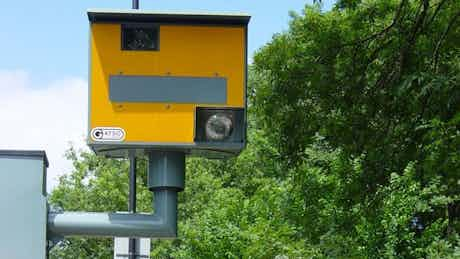UK speed camera tolerances explained
August 10, 2022 by carwow staff

Think you may have crept over the limit while going past a speed camera? Read our guide to learn all about speed camera tolerances
Speeding is not something that can be easily condoned, but it’s of a fact of life. Around 87% of drivers exceed 20mph limits, for example, while over half of us speed in 30mph zones.
Given such statistics, it’s no wonder that a lot of people may worry that they have been caught speeding by a camera, and may be wondering what the tolerances for speed cameras are. If this is you, we have everything you need to know right here.
What is the tolerance of speed cameras?
A great deal of fixed speed cameras operate on a 10% +2mph principle. This means that they will not issue a ticket if your speed was under this threshold.

So, for example, if the road you may have been speeding on had a 60mph limit, 10% of 60mph is 6mph, while plus 2mph brings the speed camera allowance to 68mph – if you were doing less than this then you shouldn’t get a ticket.
We say ‘shouldn’t’ in italics as the 10% +2mph threshold is only guidance; there really is no hard and fast way of knowing whether or not you will get a ticket until you wait for a couple of weeks (see below for how long you have to wait) to see if you get a dreaded envelope through your letterbox.
That’s because individual police forces (of which there are 43 in England and Wales) are allowed to set their speed camera thresholds independently. So while it would take a very strict chief constable to set a 0.1mph speed camera tolerance, there would be nothing stopping him or her from doing so, if they wished, as anyone travelling 0.1mph over the speed limit is technically breaking the law.
If you’d like to know more about different types of speed camera, head to our guide on the subject, or check out our article on average speed cameras.
What tolerance do police set speed cameras to?
Police catch drivers speeding via fixed cameras, mobile camera vans and with individual officers in a car, and while officers can use their judgement with regard to whether to pull you over for speeding, a Freedom of Information request back in 2019 asked police forces what they set their fixed speed camera tolerances to; the majority of forces that responded to the request said they used the 10% +2mph rule.
Some forces refused to answer the request on the grounds that they thought it would encourage people to break the law by speeding, others said they didn’t have a standard threshold, and a couple (Lancashire and London’s Metropolitan) said they used a 10% + 3mph threshold.
It’s worth pointing out that things may have changed since 2019, though, so some police forces may have different speed-camera thresholds today.
Car speedometer accuracy and speed limits
Measuring speed with pinpoint accuracy is difficult, hence the specialist timing gear carwow uses when figuring acceleration times.
The accuracy of a speedometer will even change very slightly as a car’s tyres wear, as the car will travel less distance per rotation of the wheels due to fractional changes in the tyre’s circumference. This is why anyone fitting different-sized alloy wheels to their car must either ensure the overall diameter of the wheel and tyre combination is the same as it was when the car left the factory, or have their speedometer recalibrated.
For this and other reasons, car speedometers are allowed to be inaccurate by 10% plus 6.25mph (IE at 60mph they could say you are travelling at 72.25mph) – but they can only over-read, not under-read, meaning they can tell you you are travelling faster than you really are, but not slower.
In reality, most car speedometers are far more accurate than 10% + 6.25mph, typically over-reading by no more than 3mph or so at 70mph.

How long do I have to wait to find out if I have a speeding ticket?
There is a common understanding that if you haven’t received a speeding ticket (which will be labelled as a Notice of Intended Prosecution, or NIP) within 14 days after being caught by a speed camera or van, you will either not receive one at all, or you can challenge any NIP that arrives after two weeks (individual officers will typically issue NIPs at the roadside unless your speed was significantly above them limit, though you will not be asked to pay at the same time).
This 14-day ‘rule’ comes from the fact that the police should take reasonable measures to ensure any ticket reaches you within that timeframe (although the clock starts running the day after you were caught). Delays can be caused by problems with the postal service, changes of address, if the ticket had to go through a car-rental firm or your employer, and other issues, and these circumstances would not give any reason to challenge the ticket.
If you believe you do have a valid reason to appeal based on the 14-day rule or any other reason, be warned that if your appeal is unsuccessful you could actually face a stiffer penalty than the one you were originally given.
You may be offered a speed awareness course instead of penalty points and a fine; head to our guide to speeding penalties in general, or our article on speed awareness courses for more information.
Cars Change? Carwow!
Looking for a new set of wheels? With Carwow you can sell your car quickly and for a fair price – as well as find great offers on your next one. Whether you’re looking to buy a car brand new, are after something used or you want to explore car leasing options, Carwow is your one stop shop for new car deals.















